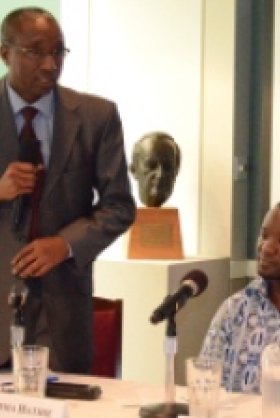Women in Iraq: Between Fear and Freedom
The condition of Iraq's women is a litmus test of the country's movement towards civil rights and democratic governance. Anita Sharma, director of the Wilson Center's Conflict Prevention Project who spent ten months in Iraq and Jordan in 2003-04, charts the paths and pitfalls of Iraqi women's difficult journey.
After last-minute disagreements, Iraq's appointed political representatives have signed the interim Iraqi constitution which will take effect after the transfer of sovereignty by the United States-led Coalition Provisional Authority (CPA) on 30 June 2004. This single event makes 8 March perhaps the most important political moment in the eleven months since the end of the three-week war that overthrew the Saddam Hussein regime.
Yet people in Iraq, and those who have worked in the country and closely followed its difficult path over these months, are aware that the political process now underway is not enough in itself to guarantee progress. It will only succeed if it is accompanied by the construction of a strong civil society that can underpin the inclusive, representative government, modern economy and sustained peace that most Iraqis long for.
No group is more aware of this than Iraqi women. Indeed, their condition is a litmus test of movement towards these objectives. To see the future of Iraq, look in the faces of its women. How, then, are they faring?
A space of one's own
The devastating attacks on the Shi'a religious commemoration of Ashura illustrate that the CPA in Iraq has been unable to ensure a safe and secure environment. This affects women in distinctive ways. Eleven months after the old regime fell, life has not returned to "normal" in Iraq. In places where kidnappings occur frequently, children must be accompanied to schools and women are escorted to the market and have taken to donning abaya (body-covering black garments) to ensure greater self-protection. One of my colleagues in Baghdad, a Shi'a woman who came to work much better dressed and coiffured than I did, wears an abaya to work. She didn't before the fall of Saddam, but now said the lawlessness scared her.
From the new authorities, there has been much rhetorical and some practical commitment to addressing the problems faced by women in Iraq. The United States has allocated $27 million for women's programmes which, alongside funds from other sources, is being used to support local women's groups in establishing educational programmes, job skills training, and seminars promoting understanding of women's rights.
In my own work with the International Organisation for Migration, I assisted in the formation of women's associations in the towns of Hilla and Diwaniya, south of Baghdad. There, I was impressed constantly with women's passion and commitment to work in insecure circumstances. One of the founders of the Diwaniya group, Raja Habib Khuzai, is now a member of Iraq's Interim Governing Council (IGC). Two other women are on the IGC, and one, Nesreen Berwari, is a member of the Iraqi cabinet.
The new Iraqi interim constitution suggested that a minimum of 25 percent of seats in the legislature go to women, rather than the mandated 40 percent quota that many had sought. The draft also includes an explicit provision that Iraqis are equal in their rights regardless of gender. It is still unclear how the 25 percent will be distributed and whether the provision will remain after power is transferred to an undetermined entity.
It is an uphill climb, but Iraqi women can look to successes in other post-conflict societies for inspiration. In East Timor without the use of quotas, women made up 27 percent of members elected to the Constituent Assembly, which drafted a constitution embodying recognition of "full equality of men and women before the law". In Rwanda, the lower house of parliament is 49 percent female. More than eighty countries around the world, recognising women's exclusion from the political process, now have quotas.
Iraq's women have other campaigns to fight. Some politicians openly advocate legislative controls over women's behaviour. Iraqi women, supported by the CPA's head Paul Bremer and others, recently pressed for repeal of the IGC's resolution 137 - a law that, as Sami Zubaida explained in openDemocracy, would have reversed many of the rights and privileges possessed by women under existing codes.
The continuing tension over this issue was evident when the proposal for repeal came to a vote: when the 15-10 vote in favour of repeal was announced, the women lobbying for this result ululated and shouted for joy, at which eight ICG members - including Ahmad Chalabi of the Iraqi National Congress - walked out in protest.
This legal struggle, important as it is, is only the visible dimension of a deeper question: women's place in the entire post-dictatorship and post-war Iraqi social and political order. If this order is to be rebuilt in a way that enables conditions for security, well-being, and justice to emerge, expensive and long-lasting commitments are required. The problem that Iraq - and Afghanistan - face here is one familiar from experience in many other countries: that laws on the books might not translate into practice on the ground.
No liberation without women's liberation
In April and November 2003, the Woodrow Wilson Center and Women Waging Peace brought more than fifty Iraqi women (including Nasreen Berwari) to Washington, DC, for a series of intensive discussions. The women represented many different political, ethnic, and religious groups, and included expatriates living in the United States, Europe, and the Middle East.
A majority of these women testified to a lack of consideration of their political rights and social needs. They also identified key ways in which women could be included in four vital sectors of Iraq's administration, and circulated their proposals throughout the CPA in Baghdad, the ICG and the authorities in Washington.
These recommendations included encouragement by the international community of strong women's representation in the leadership of donor bodies; abolishing laws impeding women's employment; ensuring the appointment of qualified, well-trained women judges throughout Iraq; and hiring Iraqi women for reconstruction tasks.
Such advances for women are too often considered a "soft issue". Yet there is nothing soft about a commitment to stability, reconstruction and democratic governance, and these can only be guaranteed if the rights of Iraqi women, more than 55 percent of the population, move centre-stage. The continuing violence, and uncertainty about who precisely will assume power on 1 July 2004, all threaten to derail movement toward democratic governance. As one Iraqi woman said to me recently: it would be tragic if the country of Iraq were liberated only for its women to be imprisoned.





